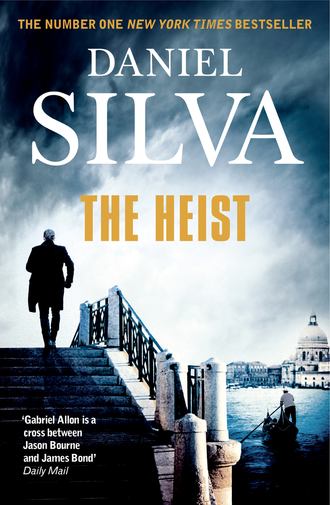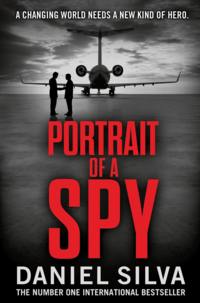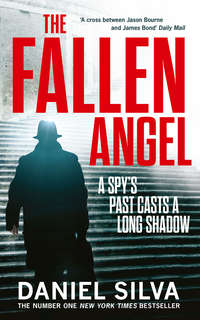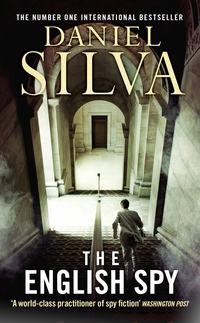
Полная версия
The Heist
“Why not you?”
“Shall I start with the obvious reasons?”
“If it makes you feel better.”
“I’m not an Italian policeman. In fact, I’m quite the other thing.”
“You have a long history here in Italy.”
“Not all of it pleasant.”
“True,” agreed the general. “But along the way, you’ve made important contacts. You have friends in high places like the Vatican. And, perhaps more importantly, you have friends in low places, too. You know the country from end to end, you speak our language like a native, and you’re married to an Italian. You’re practically one of us.”
“My wife isn’t Italian anymore.”
“What language do you speak at home?”
“Italian,” admitted Gabriel.
“Even when you’re in Israel?”
Gabriel nodded.
“I rest my case.” The general lapsed into a thoughtful silence. “This might surprise you,” he said finally, “but when a painting goes missing, or someone gets hurt, I usually have a pretty good idea who’s behind it. We have more than a hundred informants on our payroll, and we’ve tapped more phones and e-mail accounts than the NSA. When something happens in the criminal end of the art world, there’s always chatter. As you say in the counterterrorism business, nodes light up.”
“And now?”
“The silence is deafening.”
“What do you think it means?”
“It means that, in all likelihood, the men who killed Jack Bradshaw were not from Italy.”
“Any guess as to where they’re from?”
“No,” the general said, shaking his head slowly, “but the level of violence concerns me. I’ve seen a lot of dead bodies during my career, but this one was different. The things they did to Jack Bradshaw were …” His voice trailed off, then he said, “Medieval.”
“And now you want me to get mixed up with them.”
“You strike me as a man who knows how to take care of himself.”
Gabriel ignored the remark. “My wife is pregnant. I can’t possibly leave her alone.”
“We’ll keep a close eye on her.” The general lowered his voice and added, “We already are.”
“It’s good to know the Italian government is spying on us.”
“You didn’t really expect otherwise, did you?”
“Of course not.”
“I didn’t think so. Besides, Allon, it’s for your own good. You have a lot of enemies.”
“And now you want me to make another one.”
The general laid down his fork and peered contemplatively out the window in the manner of Bellini’s Doge Leonardo Loredan. “It’s rather ironic,” he said after a moment.
“What’s that?”
“That a man such as yourself would choose to live in a ghetto.”
“I don’t actually live in the ghetto.”
“Close enough,” said the general.
“It’s a nice neighborhood—the nicest in Venice, if you ask me.”
“It’s filled with ghosts.”
Gabriel glanced at the young girl. “I don’t believe in ghosts.”
The general dabbed his napkin skeptically at the corner of his mouth.
“How would it work?” asked Gabriel.
“Consider yourself one of my informants.”
“Meaning?”
“Go forth into the nether regions of the art world and find out who killed Jack Bradshaw. I’ll take care of the rest.”
“And if I come up empty?”
“I’m confident you won’t.”
“That sounds like a threat.”
“Does it?”
The general said nothing more. Gabriel exhaled heavily.
“I’m going to need a few things.”
“Such as?”
“The usual,” replied Gabriel. “Phone records, credit cards, e-mails, Internet browsing histories, and a copy of his computer hard drive.”
The general nodded toward his attaché case. “It’s all there,” he said, “along with every nasty rumor we’ve ever heard about him.”
“I’ll also need to have a look around his villa and his collection.”
“I’ll give you a copy of the inventory when it’s complete.”
“I don’t want an inventory. I want to see the paintings.”
“Done,” said the general. “Anything else?”
“I suppose someone should tell Francesco Tiepolo that I’m going to be leaving Venice for a few days.”
“And your wife, too.”
“Yes,” said Gabriel distantly.
“Perhaps we should share the labor. I’ll tell Francesco, you tell your wife.”
“Any chance we can do it the other way around?”
“I’m afraid not.” The general raised his right hand, the one with the two missing fingers. “I’ve suffered enough already.”

Which left only Julian Isherwood. As it turned out, he was being held at the Carabinieri’s regional headquarters, in a windowless chamber that was not quite a holding cell but not a waiting room, either. The handover took place on the Ponte della Paglia, within sight of the Bridge of Sighs. The general did not seem at all displeased to be rid of his prisoner. He remained on the bridge, with his ruined hand tucked into his coat pocket and his prosthetic eye watching unblinkingly, as Gabriel and Isherwood made their way along the Molo San Marco to Harry’s Bar. Isherwood drank two Bellinis very fast while Gabriel quietly saw to his travel arrangements. There was a British Airways flight leaving Venice at six that evening, arriving at Heathrow a few minutes after seven. “Thus leaving me plenty of time,” said Isherwood darkly, “to murder Oliver Dimbleby and still be in bed for the News at Ten.”
“As your informal representative in this matter,” said Gabriel, “I would advise against that.”
“You think I should wait until morning before killing Oliver?”
Gabriel smiled in spite of himself. “The general has generously agreed to keep your name out of this,” he said. “If I were you, I wouldn’t say anything in London about your brief brush with Italian law enforcement.”
“It wasn’t brief enough,” said Isherwood. “I’m not like you, petal. I’m not used to spending nights in jail. And I’m certainly not used to stumbling upon dead bodies. My God, but you should have seen him. He was positively filleted.”
“All the more reason you shouldn’t say anything when you get home,” Gabriel said. “The last thing you want is for Jack Bradshaw’s killers to read your name in the papers.”
Isherwood chewed his lip and nodded slowly in agreement. “The general seemed to think Bradshaw was trafficking in stolen paintings,” he said after a moment. “He also seemed to think I was in business with him. He gave me quite a going-over.”
“Were you, Julian?”
“In business with Jack Bradshaw?”
Gabriel nodded.
“I won’t dignify that with a response.”
“I had to ask.”
“I’ve done many naughty things during my career, usually at your behest. But I have never, and I mean never, sold a painting that I knew was stolen.”
“What about a smuggled painting?”
“Define smuggled,” said Isherwood with an impish smile.
“What about Oliver?”
“Are you asking whether Oliver Dimbleby is flogging stolen paintings?”
“I suppose I am.”
Isherwood had to think it over for a moment before answering. “There’s not much I would put past Oliver Dimbleby,” he said finally. “But no, I don’t believe he’s dealing in stolen pictures. It was all a case of bad luck and timing.”
Isherwood signaled the waiter and ordered another Bellini. He was finally beginning to relax. “I have to admit,” he said, “that you were the absolute last person in the world I expected to see today.”
“The feeling is mutual, Julian.”
“I take it you and the general are acquainted.”
“We’ve exchanged business cards.”
“He’s one of the most disagreeable creatures I’ve ever met.”
“He’s not so bad once you get to know him.”
“How much does he know about our relationship?”
“He knows we’re friends and that I’ve cleaned a number of pictures for you. And if I had to guess,” Gabriel added, “he probably knows about your links to King Saul Boulevard.”
King Saul Boulevard was the address of Israel’s foreign intelligence service. It had a long and deliberately misleading name that had very little to do with the true nature of its work. Those who worked there referred to it as the Office and nothing else. So did Julian Isherwood. He was not directly employed by the Office; he was a member of the sayanim, a global network of volunteer helpers. They were the bankers who supplied Office agents with cash in emergencies; the doctors who treated them in secret when they were wounded; the hoteliers who gave them rooms under false names, and the rental car agents who supplied them with untraceable vehicles. Isherwood had been recruited in the mid-1970s, during a wave of Palestinian terrorist attacks against Israeli targets in Europe. He’d had but one assignment—to assist in building and maintaining the operational cover of a young art restorer and assassin named Gabriel Allon.
“I suppose my release didn’t come free of charge,” Isherwood said.
“No,” replied Gabriel. “In fact, it was rather pricey.”
“How pricey?”
Gabriel told him.
“So much for your sabbatical in Venice,” said Isherwood. “It seems I’ve ruined everything.”
“It’s the least I can do for you, Julian. I owe you a great deal.”
Isherwood smiled wistfully. “How long has it been?” he asked.
“A hundred years.”
“And now you’re going to be a father again, twice over. I never thought I’d live to see the day.”
“Neither did I.”
Isherwood looked at Gabriel. “You don’t sound thrilled about the prospect of having children.”
“Don’t be ridiculous.”
“But?”
“I’m old, Julian.” Gabriel paused, then added, “Perhaps too old to be starting another family.”
“Life dealt you a lousy hand, my boy. You’re entitled to a bit of happiness in your dotage. I must admit I envy you. You’re married to a beautiful young woman who’s going to bear you two beautiful children. I wish I were in your shoes.”
“Be careful what you wish for.”
Isherwood drank slowly of his Bellini but said nothing.
“It’s not too late, you know.”
“To have children?” he asked incredulously.
“To find someone to spend the rest of your life with.”
“I’m afraid I’m past my expiration date,” Isherwood answered. “At this point, I’m married to my gallery.”
“Sell the gallery,” said Gabriel. “Retire to a villa in the south of France.”
“I’d go mad in a week.”
They left the bar and walked a few paces to the Grand Canal. A sleek wooden water taxi gleamed at the edge of the crowded dock. Isherwood seemed reluctant to board it.
“If I were you,” said Gabriel, “I’d get out of town before the general changes his mind.”
“Sound advice,” replied Isherwood. “May I give you some?”
Gabriel was silent.
“Tell the general to find someone else.”
“I’m afraid it’s too late for that.”
“Then watch your step out there. And don’t go playing the hero again. You have a lot to live for.”
“You’re going to miss your plane, Julian.”
Isherwood teetered aboard the water taxi. As it eased away from the dock, he turned to Gabriel and shouted, “What do I say to Oliver?”
“You’ll think of something.”
“Yes,” said Isherwood. “I always do.”
Then he ducked into the cabin and was gone.
5
VENICE
GABRIEL WORKED ON THE VERONESE until the windows of the nave darkened with dusk. Then he rang Francesco Tiepolo on his telefonino and broke the news that he had to run a very private errand for General Cesare Ferrari of the Carabinieri. He didn’t go into any of the details.
“How long will you be gone?” asked Tiepolo.
“A day or two,” replied Gabriel. “Maybe a month.”
“What shall I say to the others?”
“Tell them I died. It will lift Antonio’s spirits.”
Gabriel straightened his work platform with more care than usual and went into the cold evening. He followed his usual route northward, across San Polo and Cannaregio, until he came to an iron bridge, the only iron bridge in all of Venice. In the Middle Ages there had been a gate in the center of the bridge, and at night a Christian watchman had stood guard so that those imprisoned on the other side could not escape. Now the bridge was empty except for a single gull that glared at Gabriel malevolently as he trod slowly past.
He entered a darkened sottoportego. At the end of the passageway a broad square opened before him, the Campo di Ghetto Nuovo, the heart of the ancient ghetto of Venice. He crossed the square and stopped at the door of Number 2899. A small brass plaque read COMUNITÀ EBRAICA DI VENEZIA: JEWISH COMMUNITY OF VENICE. He pressed the bell, then, instinctively, turned his face away from the security camera.
“Can I help you?” a familiar female voice asked in Italian.
“It’s me.”
“Who’s me?”
“Open the door, Chiara.”
A buzzer howled, a deadbolt snapped open. Gabriel entered a cramped passage and followed it to another door, which unlocked automatically as he approached. It gave onto a small office, where Chiara sat primly behind an orderly desk. She wore a sweater of winter white, fawn-colored leggings, and a pair of leather boots. Her riotous auburn hair fell across her shoulders and upon a silk scarf that Gabriel had purchased on the island of Corsica. He resisted the impulse to kiss her wide mouth. He didn’t think it proper to express physical affection toward the receptionist of the chief rabbi of Venice, even if the receptionist also happened to be the rabbi’s devoted daughter.
Chiara was about to address him but was interrupted by the ringing of the telephone. Gabriel sat on the edge of her desk and listened as she dispensed with a small crisis afflicting a shrinking community of believers. She looked astonishingly like the beautiful young woman he had first encountered, ten years earlier, when he had come calling on Rabbi Jacob Zolli for information on the fate of Italy’s Jews during the Second World War. Gabriel had not known then that Chiara was an agent of Israeli intelligence, or that she had been assigned by King Saul Boulevard to watch over him during the restoration of the San Zaccaria altarpiece. She revealed herself to him a short time later in Rome, after an incident involving gunplay and the Italian police. Trapped alone with Chiara in a safe flat, Gabriel had wanted desperately to touch her. He had waited until the case was resolved and they had returned to Venice. There, in a canal house in Cannaregio, they made love for the first time, in a bed prepared with fresh linen. It was like making love to a figure painted by the hand of Veronese.
On the day of their first meeting, Chiara had offered him coffee. She no longer drank coffee, only water and fruit juice, which she sipped constantly from a plastic bottle. It was the only outward sign that, after a long struggle with infertility, she was finally pregnant with twins. She had vowed not to resist the inevitable weight gain with dieting or exercise, which she regarded as yet another obsession inflicted upon the world by the Americans. Chiara was a Venetian at heart, and Venetians did not flail on cardio contraptions or lift heavy objects to build their muscles. They ate and drank well, they made love, and when they required a bit of exercise, they strolled the sands of the Lido or walked down to the Zattere for a gelato.
She hung up the telephone and settled her playful gaze upon him. Her eyes were the color of caramel and flecked with gold, a combination that Gabriel had never been able to render accurately on canvas. At the moment, they were very bright. She was happy, he thought, happier than he had ever seen her before. Suddenly, he didn’t have the heart to tell her that General Ferrari had appeared like the flood to spoil everything.
“How are you feeling?” he asked.
She rolled her eyes and sipped from her plastic water bottle.
“Did I say something wrong?”
“You don’t have to ask me how I’m feeling all the time.”
“I want you to know that I’m concerned about you.”
“I know you’re concerned, darling. But I’m not terminally ill. I’m just pregnant.”
“What should I ask you?”
“You should ask me what I want for dinner.”
“I’m famished,” he said.
“I’m always famished.”
“Should we go out?”
“Actually, I feel like cooking.”
“Are you up to it?”
“Gabriel!”
She began to needlessly straighten the papers on her desk. It wasn’t a good sign. Chiara always straightened things when she was annoyed.
“How was your work?” she asked.
“It was a thrill a minute.”
“Don’t tell me you’re bored with the Veronese.”
“Removing dirty varnish isn’t the most rewarding part of a restoration.”
“No surprises?”
“With the painting?”
“In general,” she answered.
It was a peculiar question. “Adrianna Zinetti came to work dressed as Groucho Marx,” Gabriel replied, “but otherwise it was a normal day at the Church of San Sebastiano.”
Chiara frowned at him. Then she opened a drawer with the toe of her boot and absently inserted a few papers into a manila folder. Gabriel wouldn’t have been surprised if the papers bore no relation to the others already in the file.
“Is there something bothering you?” he asked.
“You’re not going to ask me how I’m feeling again, are you?”
“I wouldn’t dream of it.”
She closed the drawer with more force than necessary. “I stopped by the church at lunchtime to surprise you,” she said after a moment, “but you weren’t there. Francesco said you had a visitor. He claimed not to know who it was.”
“And you knew Francesco was lying, of course.”
“It didn’t take a trained intelligence officer to see that.”
“Go on,” said Gabriel.
“I called the Operations Desk to see whether anyone from King Saul Boulevard was in town, but the Operations Desk told me that no one was looking for you.”
“For a change.”
“Who came to see you today, Gabriel?”
“This is beginning to sound like an interrogation.”
“Who was it?” she asked again.
Gabriel held up his right hand and then lowered two of the fingers.
“General Ferrari?”
Gabriel nodded. Chiara stared at her desk as if searching for something out of place.
“How are you feeling?” asked Gabriel quietly.
“I’m fine,” she replied without looking up. “But if you ask me that question one more time …”

It was true that Gabriel and Chiara did not actually live in the ancient ghetto of Venice. Their rented apartment was on the second floor of a faded old palazzo, in a quiet quarter of Cannaregio where Jews never had been forbidden to enter. On one side was a quiet square; on the other was a canal where King Saul Boulevard kept a small, fast boat, lest Gabriel had need to flee Venice for the second time in his storied career. Tel Aviv had good reason to be mindful of his security; after many years of resistance, he had agreed to become the next chief of the Office. A year remained until his term was to begin. After that, his every waking moment would be devoted to protecting the State of Israel from those who wished to destroy it. There would be no more restorations or extended stays in Venice with his beautiful young wife—at least, not without an army of bodyguards watching over them.
The apartment had been fitted with a sophisticated security system, which chirped benignly when Gabriel pushed open the door. Entering, he removed the cork from a bottle of Bardolino and sat at the kitchen counter, listening to the news on the BBC, while Chiara prepared a platter of bruschetta. A UN panel had predicted an apocalyptic warming of the global climate, a car bomb had killed forty in a Shiite neighborhood of Baghdad, and the Syrian president, the butcher of Damascus, had once again used chemical weapons against his own people. Chiara frowned and switched off the radio. Then she looked longingly at the open bottle of wine. Gabriel was sorry for her. Chiara had always loved to drink Bardolino in the springtime.
“It won’t harm them if you take just a sip,” he said.
“My mother never touched wine when she was pregnant with me.”
“And look how you turned out.”
“Perfect in every way.”
She smiled and then placed the bruschetta in front of Gabriel. He selected two slices—one with chopped olives, the other with white beans and rosemary—and poured some of the Bardolino. Chiara peeled the skin from an onion and with a few quick thrusts of her knife turned it into a pile of perfect white cubes.
“You’d better be careful,” said Gabriel, watching her, “or you’ll end up looking like the general.”
“Don’t give me any ideas.”
“What was I supposed to say to him, Chiara?”
“You might have told him the truth.”
“Which version of the truth?”
“You have one year until you take your oath, darling. After that, you’ll be at the prime minister’s beck and call, and the security of the state will be your responsibility. Your life will be one long meeting interspersed with the occasional crisis.”
“Which is why I turned down the job several times before finally accepting it.”
“But now it’s yours. And this is your last chance to take some well-deserved time off before we go back to Israel.”
“I tried to explain that to the general without going into all the sordid details. That’s when he threatened to leave Julian rotting in an Italian jail cell.”
“He had nothing on Julian. He was bluffing.”
“He might have been,” Gabriel conceded. “But what if some enterprising British reporter decided to do a little digging into Julian’s background? And what if the same enterprising reporter somehow discovered he was an asset of the Office? I would have never forgiven myself if I’d allowed him to be dragged through the mud. He’s always been there when I needed him.”
“Do you remember the time you asked him to take care of that Russian defector’s cat?”
“How could I forget? I never knew Julian was allergic to cats. He had a rash for a month.”
Chiara smiled. She placed the onion in a heavy skillet with olive oil and butter, quickly chopped a carrot, and added it, too.
“What are you making?”
“It’s a local meat dish called calandraca.”
“Where did you learn to make it?”
Chiara glanced at the ceiling, as if to say such knowledge was to be found in the air and the water of Italy. It wasn’t far from the truth.
“What can I do to help?” asked Gabriel.
“You can stop hovering over me.”
Gabriel carried the platter of bruschetta and the wine into the small sitting room. Before lowering himself onto the couch, he removed the gun from the small of his back and placed it carefully on the coffee table, atop a pile of bright magazines having to do with pregnancy and childbirth. The gun was a Beretta 9mm, and its walnut grip was stained with paint: a dab of Titian, a bit of Bellini, a drop of Raphael and Tintoretto. Soon he would no longer carry a weapon; others would carry weapons on his behalf. He wondered how it was going to feel to walk through the world unarmed. It would be akin, he thought, to leaving home without first putting on a pair of trousers. Some men wore neckties when they went to the office. Gabriel Allon carried a gun.
“I still don’t understand why the general needs you to find out who killed Jack Bradshaw,” Chiara called from the kitchen.
“He seems to think they were looking for something,” replied Gabriel, leafing through the pages of one of the magazines. “He’d like me to find it before they do.”
“Looking for what?”
“He didn’t go into specifics, but I suspect he knows more than he’s saying.”







